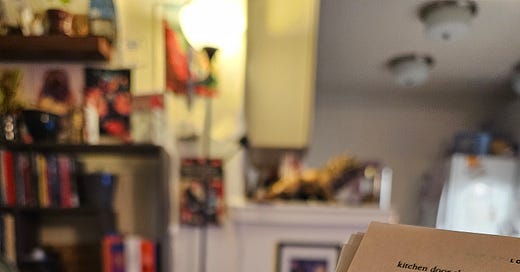Expressing Dread in Future Home of the Living God by Louise Erdrich
Thoughts on how Louise Erdrich builds dread in Future Home of the Living God
Writing Skins is a reader supported author newsletter that shares excerpts from an award nominated speculative fiction writer’s craft journals. It offers a vulnerable, funny, and interesting look at the writing life, craft, and storytelling.
Craft Chat is the writing craft section of the newsletter where subscribers and me go through a subject, piece of media, or technique together.
Should I have picked up and read Louise Erdrich’s Future Home of the Living God in January amid the flurry of 30 or so executive orders and the people being herded up, kidnapped, disappeared, beaten, murdered, and the deep rooting all-encompassing dread?
Yes. I think so.
I think Future Home of the Living God (just like Parable of the Sower and Talents, like Fahrenheit 451, like Paris is Burning, like …) is helping me find a way to write about this current moment in the way I need to within my work. Because I am a writer who finds it important not to hide the world within their work. Or try to create a story that is an escape from the world. I want to write roadmaps, stories that are plans, that are cathartic by doing the hard work.
Future Home of the Living God is not cathartic. It is not a novel with a happy ending or a release. It is a novel that captures that particular fantastic moment in that fictional world in a way that isn’t too far from the reality of our world.
“And all the while as the light slants lower and lower, bathing us in a gorgeous smoldering glow, my heart slowly cracks. The deep orange gold of the sun is pure nostalgia. An antique radiance already shed itself upon this beautiful life we share.” (Future Home of the Living God pg. 61)
The novel, which is strange and dark, centers on a woman who is pregnant during a time in a possible future where evolution is reversing and pregnant people are being rounded up, tortured, mutilated, and turned into birthing farms in a mad attempt to change or stop what is happening. It’s a harrowing novel that is at times nauseating to read, but it shows how easily dread and hopelessness can and often does coexist with normalcy:
“My parents share a bottle of wine and don’t notice that I drink lemonade instead or that I cannot finish my pancakes. They wave at neighbors, trot to the fence to chat…We make plans to stay, to run, to hide, to live normally. We decide to stay vigilant, then argue about whether vigilance is a strategy.” (pg. 61)
In many passages throughout the book, Erdrich holds the dread, zooms in on it. Makes it something that is recognizable and unignorable. It’s why it took me over a week to finish because I would stop after lines and passages such as the one, I’m weeding through in this essay and have to go back and re-read it or even more excruciating, I had to put the book down and experience it without running away. Good prose has a way of doing that, recreating this intimate looking that forces us to see over the fence we, society, capitalism, imperialism, and fear have nailed in around us.
“I grow heavy, rooted in my lawn chair. Everything I say and everything my parents say, the drift of friends…and the squirrels launching themselves without fear…all of this is terminal.” (pg. 61)
For many writers, they tend to see dread and horror as the same thing. To achieve one you need the other. But in the most dreadful scenes in the novel, there is no “horror” present. The monster isn’t a large blood thirsty monster, but regular people doing terrible things with smiles on because it’s what they are supposed to do. And that is scarier than any fanged beast. Dread is that beating heart before the terror or horror. In Future Home of the Living God, there is always something more horrible around the next page and even the moments like the one I’ve pulled excerpts from where the character is among family and friends even feel sickening and dreadful.
Erdrich did an interview about the novel in the December 2017 issue of Lightspeed Magazine and explored a little about why she wrote this novel when she did and how it was a response to the world and feelings of dread around her: “2001-2002 was apocalyptic…Then of course 9/11 and the gathering of transparently false intelligence in order to invade Iraq…So I was sickened and furious when George W. Bush signed the global gag rule, which condemned women around the world to bear children whether or not they were physically capable. I started the book then because I couldn’t deal with the world in any other way. I finished it this year for the same reason.”
What have you been reading this year so far?



